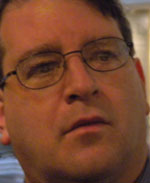 TO
BE A JEWISH COMPOSER
TO
BE A JEWISH COMPOSER
Michael Reid Winikoff
As a young boy growing up on the North Side of Minneapolis in the early 1960s, I remember attending Friday night services at Beth El Synagogue on Penn Avenue North with my parents, and seeing a handful of men and women in blue choir gowns enter from a door on the pulpit and take their place around the cantor’s podium. They faced the congregation as the cantor, in his black gown and tall cap, faced the Ark, a perfect arrangement for him to conduct them as he chanted the liturgy in his rich baritone. The eight or ten singers opened their mouths and glorious a cappella harmonies filled the sanctuary, adding an entirely new dimension to the proceedings. An indelible impression was made that would lead me, a few short years later, to join the Saturday morning junior choir and, the very week after my bar mitzvah, the Friday evening adult choir, both under the masterful leadership of Cantor David I. Silverman (z"l).
Along with my synagogue experiences were those in public school chorus. In high school, under the august guidance of Gordon Griebenow, I was to make the intimate acquaintance of Handel’s Messiah, Haydn’s The Creation and Mendelssohn’s Elijah, along with other works by Bach, Beethoven, Brahms, Schütz, Scarlatti, and others. Exposure to great classical works from Renaissance to Modernism would help widen and deepen my musical vocabulary beyond the Jewish realm.
Before long I found myself frequently conducting the Beth El Choir, particularly during a year-long absence of our long-time conductor, William Torodor. Through ten years of Friday evening services and back-to-back double services on Rosh Hashanah and Yom Kippur, I absorbed an aural sense of our liturgical chants both from the hazzan’s solo singing and from our traditionally-rooted choral repertoire.
My career as a singer also has served as training for
my composing. Having studied voice with such renowned singers as Mignon Dunn and Ellen Repp, along with coaching and master classes
with the likes of Nico Castel, John Moriarty, Eleanor Steber and Gerard
Souzay, my learning process has continued in later years, singing
(and frequently premiering) new choral works with such venerable choral
organizations as The
Dale Warland Singers and
Philip Brunelle's renowned
VocalEssence,
and performing under the batons of such distinguished conductors as
the late Robert Shaw, Bobby McFerrin, Simon Halsey, Philip Brunelle, Eric Whitacre and
Helmuth Rilling. I have been an enthusiastic
participant for several summers at the
North
American Jewish Choral Festival, singing under the baton of Mati
Lazar. And I have been a long-time member (since 1969) of the Beth
El Choir.
Besides Cantor Silverman, my cantorial instructors at JTS were Max
Wolberg (z"l), Charles Davidson and Henry Rosenblum. A cantorial soloist for over 30 years, I have held High Holy Day
positions in the Chicago, New York City and Minneapolis areas -
including 13 years at Highland Park Conservative Temple in Highland Park
NJ, and more recently at B'nai Emet Synagogue and
Sharei Chesed Congregation in
the greater Minneapolis area.
My first attempts at composing, around age 15, were probably inspired by singing Zavel Zilberts’ famous setting of Ahavat Olam – music of pathos, drama and complexity. Except for a brief one year of study with modernist Miriam Gideon (z"l) at the Jewish Theological Seminary, I am largely self-taught as a composer. I am a member of the American Composers Forum and the Guild of Temple Musicians..
Here is the cumulative and stylistically varied product of my labor: Jewish sacred choral music of dignity and substance; music that I take great pride in, that I hope will prove as spiritually inspiring and gratifying to cantors, choirs and congregations in experiencing it as it has to me in creating it. It is my humble prayer that these works might come to represent a worthy contribution toward reawakening and enhancing a culture of substantive and skillful choral singing in our Jewish ritual life.
No telling where I would be without those early musical impressions. My path might have taken a much different turn. Life would be missing that “entirely new dimension” that music has added.
Here’s wishing you gratification, enrichment and inspiration in all your musical experiences!
- MRW
